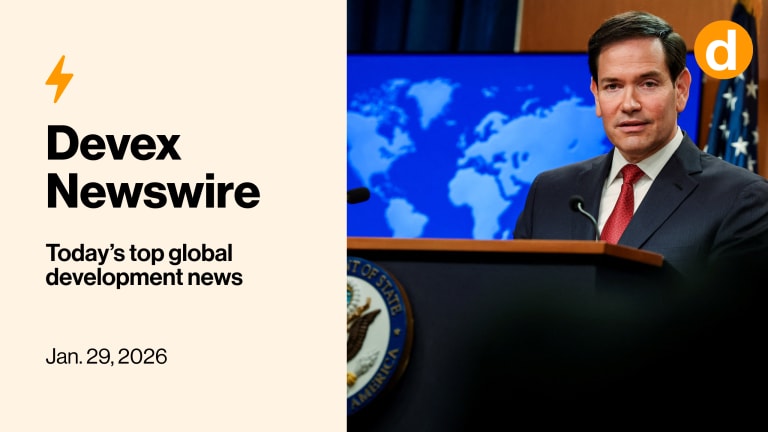Presented by Schmidt Futures

When social and economic trauma strike, governments tend to prioritize their domestic woes. Pandemic recovery, food insecurity, the cost-of-living crisis, and inflation have cast commitments to foreign development aside just as the world’s lowest-income countries need it most. We looked at development funding and widening financing gaps during our fourth Devex Invested: Future of Development Finance event in London.
Also in today’s edition: A look at the United Kingdom's new development minister, and and USAID responds to staffing issues.
Pandemic preparedness running short
The tongue-twisting Financial Intermediary Fund for Pandemic Prevention, Preparedness and Response — seriously, try saying that a few times — has hit a snag. It needs to raise $10.5 billion annually, but donors have given a paltry 10% of that.
This is a preview of Newswire
Sign up to this newsletter for an inside look at the biggest stories in global development, in your inbox daily.
To be fair, aid is getting hit globally as governments focus on shoring up their coffers for domestic issues, while Russia’s war in Ukraine has siphoned off aid. But we haven’t even seen the back of COVID-19 yet, so pandemic prevention might be worth a pledge or two more.
The issue was raised during a discussion yesterday — moderated by my colleague Jessica Abrahams — at the Future of Development Finance event hosted by Devex.
“Where are contributions going to come from?” asked Peter Baker from the Center for Global Development, adding that there’s no obvious source of expanding global health money.
The fund, niftily shortened to the acronym FIF, is housed at the World Bank and pools public and private money to prevent, prepare for, and respond to future pandemics.
“It's a very bad moment for development finance, including for the $10.5 billion, and we've both got to restore the political will and make people realize that these problems are shared problems,” said Mark Malloch-Brown, president of the Open Society Foundations. “We have to recover that message and sense of will and momentum.”
Read: The pandemic readiness fund is short on cash. It's not the only issue.
+ Missed our event in London? Watch it on YouTube.
The return of Mitchell
In a major plot twist, Andrew Mitchell has been appointed development minister in new U.K. Prime Minister Rishi Sunak's government. The former Department for International Development secretary, who ran it between 2010 and 2012, is genuinely passionate about development, having spent many years in opposition preparing for the role.
The move was totally unexpected as Mitchell was the ring leader of a Conservative rebellion against Sunak’s decision to cut the aid budget from 0.7% to 0.5% of gross national income — proving a major thorn in the side of the government for many months, according to my colleague William Worley.
The U.K.'s embattled development sector was abuzz with excitement last night at news of the appointment, with some even speculating that Mitchell would not have taken the job if a return to 0.7% was not on the table. Mitchell, however, declined to comment, and directed Devex to a tweet that said he was “Humbled and honoured to have the opportunity to serve as Development Minister.”
Still, there are fears that the aid budget could be slashed further to 0.3% of GNI. If that cut goes ahead, it could cost around 180,000 lives in money taken from health programs on preventable deaths, according to newly released research by the Center for Global Development.
ICYMI: What incoming Prime Minister Rishi Sunak could mean for UK aid (Pro)
+ Check out all our coverage of the U.K. aid sector.
Overall, up Down Under
Yesterday, Australia’s government announced how its newly boosted aid budget — increased by 1.43 billion Australian dollars ($926 million) this year under a new government that has pledged to increase funding by 2.5% yearly — will be spent. Devex contributor Lisa Cornish has a detailed rundown of where the money will go.
A lot of spending is focused on the Indo-Pacific region, including doubling the available grant allocation through the Australian Infrastructure Financing Facility for the Pacific — which was established to combat the influence of Chinese development in the area.
Read more: How Australia's newly boosted aid budget will be spent (Pro)
+ A Devex Pro subscription brings you essential analysis, data-driven funding insights, and access to the world’s largest global development job board. Get these perks and more by signing up to our 15-day free trial.
Short-staffed
As the U.S. Agency for International Development’s need to address the war in Ukraine and the global food crisis has stepped up, so has concern over understaffing at USAID’s Bureau for Humanitarian Assistance.
Last week, Devex published a rundown of the agency’s workforce problem as it tries to handle overlapping crises — and the Republican lawmakers who were concerned that the pace of aid was slow.
Now my colleague Michael Igoe reports that USAID has responded, calling staffing issues one of Administrator Samatha Power’s “top priorities.” The letter from USAID Assistant Administrator for Legislative and Public Affairs Jodi Herman also spoke of plans to increase the number of contracting officers in the bureau — from five to seven — and to use pay incentives to boost its hiring push.
Read: USAID responds to humanitarian spending, staffing concerns
In other news
A Lancet Countdown report found that climate change poses severe impacts on human health globally, in the form of extreme heat, air pollution, and other negative effects. [BBC]
United Nations officials said Tuesday that Syria is in the grip of its worst economic crisis since 2011, citing cases of infighting, violence, and a rapidly spreading cholera outbreak. [AP]
Low- and middle-income nations are losing billions to illegal and unregulated fishing, according to new research from the Financial Transparency Coalition, which says the practice also causes destruction to ecosystems. [The Guardian]
Sign up to Newswire for an inside look at the biggest stories in global development.








